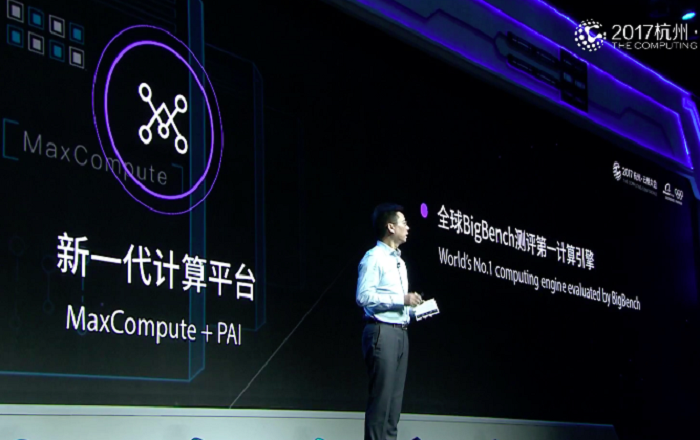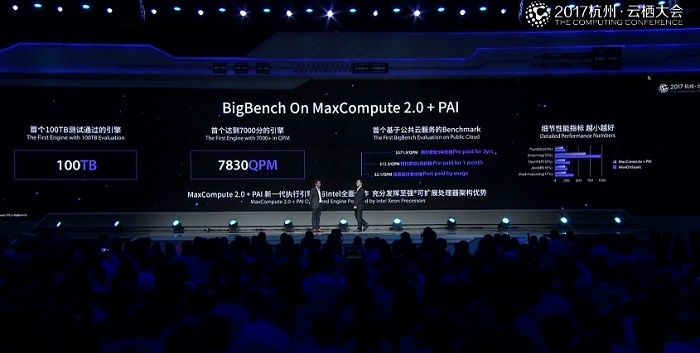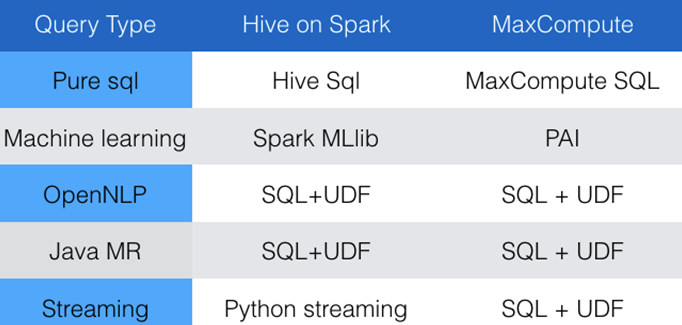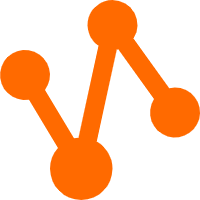
In the first day of the 2017 Hangzhou Computing Conference on Oct. 11, Alibaba Cloud President Hu Xiaoming introduced a next-generation computing platform MaxCompute + PAI.

In the main forum on the 12th, Zhou Jingren, Alibaba Group Vice President and director from the Search Division and Computing Platform Division, said that data lays the foundation for artificial intelligence innovation, and possessing plenty of computing capabilities to help fully release the value of the data. Later, Zhou Jingren released BigBench On MaxCompute[1] 2.0 + PAI with Rob Hays, Vice President of Intel's Data Center Division. The release broke the best records set by TPCx-BB[2] and reflected the extremely robust data processing capabilities of MaxCompute and the absolute strength of public cloud compared to the traditional model.

At present, the maximum capacity publicized by TPC is 10 TB, the best performance is 1491.23 BBQpm, and the best price/performance ratio is 589 Price/BBQpm. Alibaba Cloud's BigBench on MaxCompute 2.0+PAI expands that capacity to 100 TB for the first time in the world, which is also the first benchmark to be based on public cloud services. Engines running on this platform achieve 7000 points.
It was reported that MaxCompute test environment would be open for one month on public cloud after the conference and that the BigBench On MaxCompute+PAI SDK (inherited from TPCx-BigBench and enabling it to run on the big data environment of Alibaba Cloud) would be open-source for developers to use.
The great capacity breakthrough of BigBench on MaxCompute owes to MaxCompute's mass data processing capabilities and machine learning algorithm efficiency. MaxCompute, based on the Apsara distributed OS developed by Alibaba Cloud, can connect more than 10,000 servers in a single cluster and process Exabytes of data.
MaxCompute next-generation engines get continuous and in-depth performance optimization in the Compiler, Optimizer, and runtime. In addition to high-performance computing, Alibaba Cloud PAI provides users with a robust algorithm experiment platform which includes traditional machine learning as well as the latest in deep learning and enhanced learning. PAI provides a great number of algorithms and tools to meet algorithm requirements in different business scenarios. The platform is also optimized for performance and data capacity.
Furthermore, MaxCompute and Intel processor integration and in-depth optimization enable full use of Intel Xeon® Scalable Processor's structural strengths. Rob Hays, Vice President of Intel's data center division, said "We are delighted to be working with Alibaba Cloud to optimize MaxCompute on the latest Intel® Xeon® Scalable processor platform and to witness the excellent performance of MaxCompute in the BigBench test."
Well, What computing bonuses does BigBench on MaxCompute2.0+PAI bring for developers to help them seize more market opportunities?

BigBench on MaxCompute is also an industrial benchmark, which demonstrates the software stack integrity of MaxCompute in big data processing and the superior performance in capacity, cost, and scalability.
BigBench on MaxCompute is very easy to access. Enterprise customers can connect to the platform provided they have prepared:
[1] BigBench on MaxCompute is derived from TPCx-BB, so it is compatible with all TPCx-BB semantics.
[2] TPCx-BB (BigBench) was released by Transaction Processing Performance Council (TPC) in Feb. 2016. First E2E big data analysis app-level benchmark.

2,593 posts | 789 followers
FollowAlibaba Cloud MaxCompute - March 2, 2020
Alibaba Clouder - April 10, 2018
Alibaba Cloud MaxCompute - October 12, 2018
Alibaba Clouder - November 27, 2018
Alibaba Cloud MaxCompute - September 12, 2018
Alibaba Clouder - November 22, 2017

2,593 posts | 789 followers
Follow MaxCompute
MaxCompute
Conduct large-scale data warehousing with MaxCompute
Learn More Data Lake Storage Solution
Data Lake Storage Solution
Build a Data Lake with Alibaba Cloud Object Storage Service (OSS) with 99.9999999999% (12 9s) availability, 99.995% SLA, and high scalability
Learn More Storage Capacity Unit
Storage Capacity Unit
Plan and optimize your storage budget with flexible storage services
Learn More Hybrid Cloud Storage
Hybrid Cloud Storage
A cost-effective, efficient and easy-to-manage hybrid cloud storage solution.
Learn MoreMore Posts by Alibaba Clouder